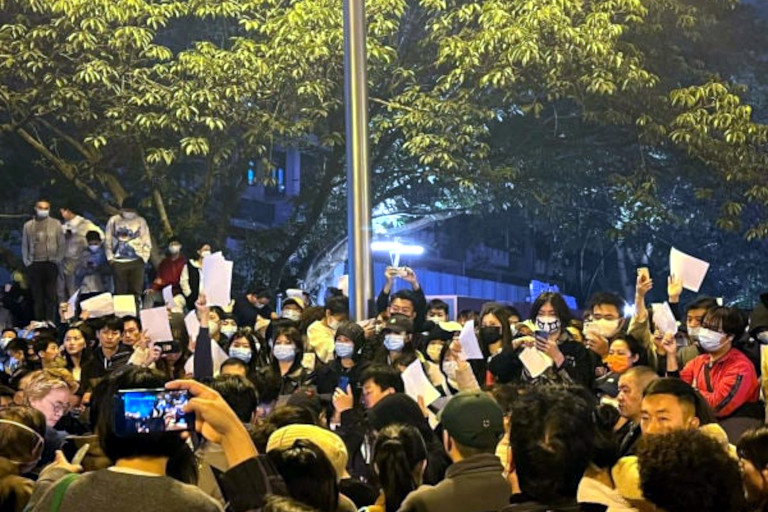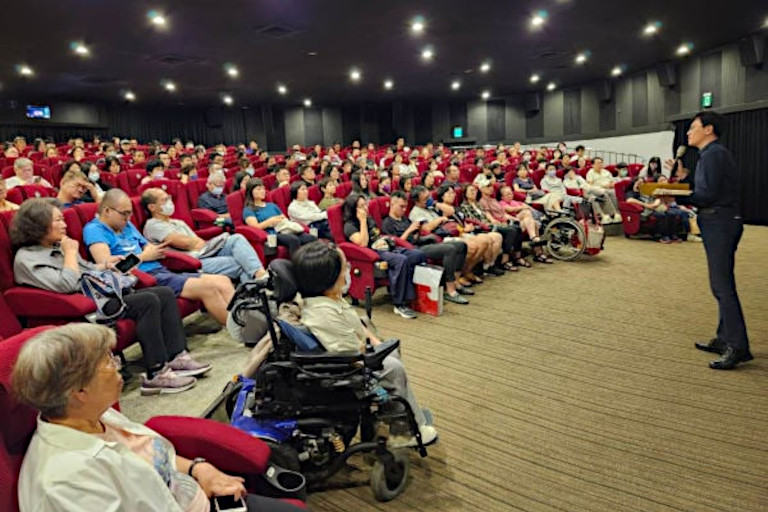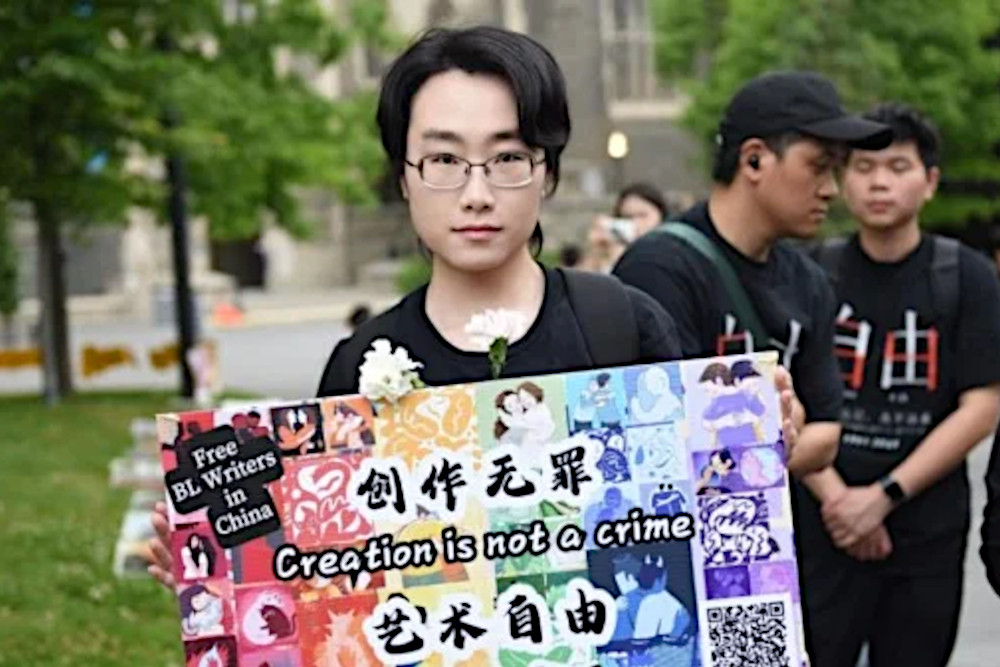Growing up under China’s information control and state-run education, a young woman named Hanly found the courage to break free. Born in Beijing and educated in Kunming, she was raised on Chinese Communist Party (CCP) propaganda — but over time, she awakened to the truth behind the regime’s messaging. Her journey took her from quiet doubts to bold resistance, and finally to a new life in Canada, where she now works to expose and protest what she once dared not talk about.
Seeds of doubt in an obedient childhood
Born in 1996, Hanly came of age in China’s tightly controlled education system. Like millions of schoolchildren, she wore the red scarf of the Young Pioneers and absorbed the CCP’s ideology from an early age. But unlike many of her peers, Hanly was deeply influenced by books, films, and theater. Her independent reading introduced her to concepts such as universal values, constitutional government, freedom of the press, and judicial independence — ideas that made her instinctively question what she was being taught.
“Even in elementary school, I sensed something was wrong,” she recalled. “Phrases like ‘the Party’s interests above all else’ and ‘collectivism’ didn’t sit right with me. I couldn’t explain why back then — it was just a vague discomfort.”
Those early questions became sharper when she entered university in Kunming. In 2015, Hanly began using software to bypass China’s Internet firewall. Through it, she encountered a wave of uncensored information: documentaries on the Tiananmen Square Massacre, coverage of the Hong Kong anti-extradition protests, and more. The contrast between official Chinese narratives and overseas reporting was shocking.

“Seeing two million Hongkongers peacefully protest for their rights moved me deeply,” she said. “Their courage made me realize that many people in China still hold on to freedom.”
But it was the footage from June 4, 1989 — of tanks crushing peaceful protesters — that left the greatest impact.
Hanly said: “Millions protested peacefully, but they were gunned down. That’s when I understood: In China, peaceful resistance won’t work. They have tanks. We have only our conscience.”
A blocked account and a turning point
In 2018, Hanly’s quiet questioning turned into open critique. That year, Xi Jinping removed the presidential term limit from China’s constitution. As a Weibo blogger with over 400,000 followers, Hanly reposted a comment asking: “Don’t you really know what this means?” Her account was blocked overnight, without warning or appeal.
“I’d had that account for nearly ten years — movie reviews, chats with friends, even 4,000 yuan in ad revenue — wiped out in an instant,” she said.
Attempts to appeal through customer service and the legal system went nowhere. Weibo only stated that she had “violated the law” without specifying which rule she had broken. Even after filing a lawsuit, she received no response. That moment made something click.
“The CCP doesn’t just tolerate censorship — it encourages it,” she realized.
From then on, Hanly began self-censoring — using code words, metaphors, and homophones to express herself. But it took a toll. “I couldn’t speak freely. For the first time, I felt the oppression so strongly that I wanted to leave China.”
White Paper Revolution: From protest to exile
In 2022, Hanly experienced the full weight of China’s control during the Shanghai lockdown. She witnessed residents trapped by digital health codes, food shortages, and even deaths caused by the government’s strict “zero-COVID” policies.
“People fought over cabbage selling for 500 yuan [US$70]. Donated vegetables were resold by officials. The sick and elderly died because no one would help them.”
Then came the fire in Urumqi. Trapped residents died due to lockdown barriers, sparking national outrage. In Shanghai, mourners gathered with candles and flowers on Urumqi Road — an act the police labeled “illegal flower-laying.”
Hanly filmed the crowd singing Tomorrow Will Be Better, only to be accused — along with others — of “inciting subversion of state power.”
“Flowers and candles frightened them — that shows just how fragile the regime is,” she said.
Protesters soon began holding up blank sheets of paper, symbolizing censored voices. Hanly documented the movement on her blog. But soon after, police raided her home, confiscated her electronics, and threatened her parents.

“I didn’t know what they were after, so I remotely wiped all my devices.”
It became clear she could no longer stay. In December 2022, just before the White Paper movement was crushed, Hanly escaped to Canada on a student visa.
Finding freedom and a new mission in Canada
Hanly calls her escape “a stroke of luck.” Friends who remained in China faced harsh interrogations and pressure to betray each other. Some were punished at school or lost their jobs for participating in the protests.
In Canada, Hanly found what she had long yearned for: fresh air, open speech, and political freedom.
After completing her studies in Ottawa, she moved to Toronto and became an active member of the local Chinese dissident community. On the anniversary of June 4, 2025, she joined the Canadian Committee of the China Democratic Party and took part in memorial events hosted by pro-democracy groups.
“In Canada, I can finally speak the truth without fearing arrest or censorship,” she said. But she also knows that democracy in China remains a distant dream.
To help bridge that gap, Hanly launched the podcast Cybership, where she interviews the Chinese diaspora in 16 countries. “We want people in China to understand what the outside world is really like. If you’re determined to leave, the sea will open a path for you.”
From awareness to action
Hanly’s understanding of the CCP followed a clear arc: from vague discomfort, to awakening, to resistance. Early exposure to universal values opened her eyes. The 2018 Weibo ban revealed the regime’s true stance on free speech. And the White Paper Revolution convinced her that peaceful protest alone was no longer enough.
“Under CCP rule, freedom has a price,” she said. “June Fourth and the White Paper movement are both our wounds — and our beacons. We will not be silenced.”
She sees today’s protestors as the heirs of Tiananmen’s legacy. Whether online or in the streets, every voice brings China a step closer to democracy.
Hanly also flew to Taiwan last year to watch the documentary State Organs, which exposed the ongoing practice of live organ harvesting in China. It left her shaken.

“This isn’t just a human rights issue — it’s a challenge to the bottom line of civilization itself,” she said. “These victims had already been stripped of their rights and beliefs. Now they’re treated as organ sources. That’s the ultimate dehumanization.”
“Truth is what dictators fear most”
Long before she left China, Hanly had already attracted the attention of state security. Her parents were routinely harassed around politically sensitive dates. Even after her escape, officers visited her family’s home or called with threats: “Turn yourself in. Stop slandering the country overseas.”
“How fragile must a regime be if a few posts, a few protests, or a few signatures can shake it?” she asked. “Don’t be afraid of them.”
Hanly is now focused on building a free China from abroad. She continues her advocacy through podcasts, documentaries, and local events. She also urges people still in China to quietly document their experiences — to preserve truth while protecting themselves.
“Speaking out takes courage. But it’s not enough. We need action to end this tyranny.”
Translated by Chua BC
Follow us on X, Facebook, or Pinterest

